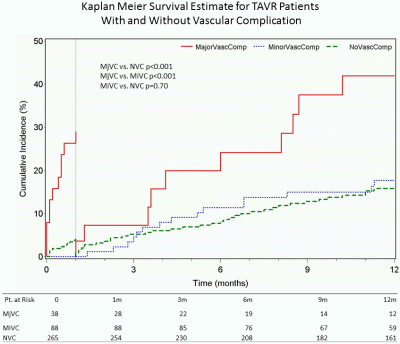Background: Major vascular complications (MjVC) of TAVR are associated with poor long term outcome. Since in-hospital mortality is included in the 2nd Valve Academic Research Consortium definitions of MjVC, the long term outcome of patients that had MjVC and survived to discharge and 30 days is less clear. It is hypothesized that MjVC is associated with long term mortality even if patients survived the first 30 days post-TAVR as compared to patients with no vascular complication (NVC) or those that had minor vascular complications (MiVC).
Methods: 392 patients that underwent trans-femoral TAVR were included. A comparison was completed between patients that had NVC (n=266), MiVC (n=88) and MjVC (n=38). Survival estimate included a landmark analysis capped at 30 days post-TAVR.
Results: No differences were noted in the baseline characteristics of patients with MjVC, MiVC or NVC (Age 85.2±4.8,82.9±7.3,82.5±8.6;p=0.05,STS score 10.1±3.7 vs. 9.4±4.1 vs. 9.1±4.6;p=0.4, ejection fraction 52.8±13.6% vs. 52.2±13.1 vs. 53.1±14.1;p=0.8 respectively) . Compared with patients with NVC or MiVC, those with MjVC had longer hospitalization (4 [3-7], 5 [4-7], 8 [6-16] days; p
Conclusions: MjVC continues to be associated with poor outcome after TAVR even if patients survived to 30 days. This might be related to the procedural and post-procedural complication and not to the baseline characteristics of the patient and thus these patients should be subjected to special surveillance and care.


